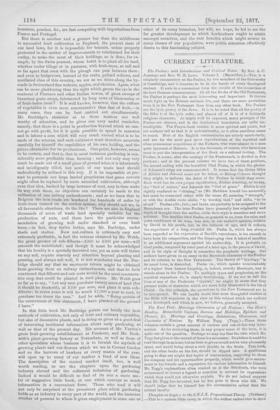CURRENT LITERATURE.
The Psalms; with Introductions and Crilicai Notes. By Rev. A. C. Jennings and Rev. W. H. Lowe. Volume I. (Maamillan.)—This is a scholarly commentary on the Psalms, by two members of the University of Cambridge, and it deserves to be in the hands of every theological student. It puts in a convenient form the Jesuits of the researches of the best German commentators. Of all the Books of the Old Testament, the Psalter is perhaps the most interesting and important. It throws much light on the Hebrew national life, and there are more quotations from it in the New Testament than from any other book. The Psalms are the !pie poetry of the Jews. It is to be noted that all the poetry of the Bible is of the lyric order, and almost all of it is of a distinctly religious character. As might well be expected, many passages of the Psalms are obscure, and in the Authorised translation are quite un- intelligible. The Prayer-book version is more spirited and poetic, but our authors toll us that it is untrustworthy, as it often sacrifices sense to sound. Most of the English commentaries are utterly unscholarly, and are for the most part mere reproductions of the mystical and often nonsensical expositions of the Fathers, who were almeat to a man quite ignorant of Hebrew. It is the Germans, of course, who have done, most to put the interpretation of the Book on a rational footing. The Psalter, it seems, after the analogy of the Pentateuch, is divided in five portions ; and in the present volume we have two of these portions, the second ending with the beautiful 72nd Psalm., in which the glories of Solomon's reign are commemorated. It seems that the divine titles of Elohim and Jehovah most not he taken, as Bishop Colenso thought they might, to indicate the dates of the Psalms in which they occur. Each word has its own ',roper signification, Elohinz denoting, as we say, the "God of nature," and Jehovah the "God of grace." Elohim is not rightly rendered as "shining," as (Mr. Matthew Arnold has assumed), but must be connected either with the name El, meaning " strength," or with the Arabic roots aloha, "to worshiP God," and aliha, "to be afraid." Psalms xliv., lxiv., and lxxix. are probably to be assigned to the Maccabrean era, The later Psalms have generally loss originality and depth of thought than the earlier, while their style is smoother and more polished. The familiar 2fird Psalm, so grateful to us, from the calm and quiet confidence of its tone, was not, in our author's opinion, written by David in his youth, but in the fullness of age, and it reflects the experience of a long, eventful life. Psalm Ii., which has always been regarded as the expression of David's repentance, is too smooth to have been his composition, and the disparaging view it takes of sacrifice is an additional argument against his authotship. It is probably an ideal psalm, composed by some'peet of a later ago, in the person of David, and in its style of thought it resembles the prophetic writings. Our authors have given us an essay on the Messianic character of the Psalter and its relation to the New Testament. The theory of "typology," in its usual form, is discarded. Psalm ex., which speaks unmistakably of a higher than human kingship, is, indeed, strictly Messianic, but it stands alone in the Psalter. To multiply types and prophecies, as the mystical expositors do, is simply bewildering. If we are to call the lives of any of the Psalmists "typical," we ought to moan that they present traits of character which are more fully illustrated in the life of Christ. On this principle, the quotations in the New Testament are to be interpreted. We can hardly doubt that most thoughtful readers of the Bible will acquiesce in the view on this subject which our authors have developed, and whioh is now, we believe, generally accepted.






























 Previous page
Previous page